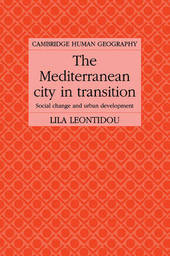
|
The Mediterranean City in Transition: Social Change and Urban Development
Paperback / softback
Main Details
| Title |
The Mediterranean City in Transition: Social Change and Urban Development
|
| Authors and Contributors |
By (author) Lila Leontidou
|
| Series | Cambridge Human Geography |
|---|
| Physical Properties |
| Format:Paperback / softback | | Pages:316 | | Dimensions(mm): Height 229,Width 152 |
|
| Category/Genre | Human geography |
|---|
| ISBN/Barcode |
9780521025256
|
| Classifications | Dewey:307.1416 |
|---|
| Audience | | Professional & Vocational | |
|---|
| Illustrations |
Worked examples or Exercises
|
|
Publishing Details |
| Publisher |
Cambridge University Press
|
| Imprint |
Cambridge University Press
|
| Publication Date |
30 March 2006 |
| Publication Country |
United Kingdom
|
Description
Postwar capitalist development has involved a transition from polarization toward diffuse urbanization and flexibility. The timing and form of this transition and its effects on spatial structures have varied, as is especially evident in the case of Mediterranean Europe. Focusing upon Greater Athens between 1948 and 1981 - the crucial period of the transition - Lila Leontidou explores the role of social classes in urban development. The emergence of new processes in cities such as Athens, Salonica, Rome, Naples, Milan, Madrid, Barcelona and Lisbon is different in both timing and manner from that of northern European cities, but, as Dr Leontidou argues, this should not be attributed to poverty or inexplicable cultural peculiarities. Instead interaction between popular spontaneity, economic forces and State control has played a major role.
Reviews"Using secondary sources for comparisons with other Mediterranean cities and archival studies for Athens, Leontidou has amassed considerable evidence--much of it presented in tables and maps--about how working-class migrants provided shelter for themselves in an unregulated building economy. Taken as an empirical account, Leontidou's book fills a gap in the literature." Josef W. Konvitz, Journal of Interdisciplinary History
|